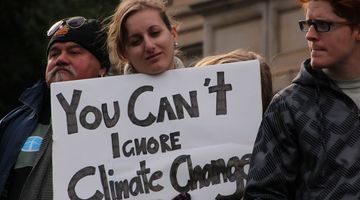This is a collection of personal thoughts on the importance of climate1 science and becoming a scientist.
Jargon alert
Ros refers to her “PhD viva”. A viva is an oral exam, it comes from the Latin term ‘viva voce’.
Transcript
Professor David Harwood
What is science? Science is a process of thought. Science is the way you think about the world. Science is the way you ask questions to find out new things.
Professor Raymond Pierrehumbert
Science has given people indoor lighting. Science has given people computers. Science has given people enormous mobility through transportation. Science has given people amazing improvements in healthcare for those who can afford to have it.
Associate Professor Nancy Bertler
I guess I always knew I wanted to work in environmental issues. I wanted to be one of the people that saved the planet, but it didn’t lead me directly to science. I started off trying to be a graphic designer, studying this for a while because, I thought, for example, Greenpeace needed a much better PR. They have of course a good PR. I discovered that wasn’t me at all, and then I studied physics for a while because I thought this would be the way for me to drive technology that could be environmentally friendly. But then I realised that, really, science from a curious point of view, finding out about climate and how it works was really what excited me and where I could make a contribution, so this is how I got to science.
Professor Ros Rickaby
I had an external examiner for my PhD2 viva who was a very renowned climate scientist. I remember coming out of my viva and talking with this examiner, and he was asking me what I was going to do next, and I said I was a little undecided and toying with the idea of going into the business world, and he said, “Well, the problem of climate change3 is such an important problem, and it’s up to your generation to solve it. We need good scientists to solve this problem now.”
And it’s really our responsibility, actually, to study and understand past climates, the evolution of the planet to the modern day so that we can try and either ameliorate the future or at least understand the future.
I was talking with somebody about what the problem of climate change is like, and they said it’s rather like being in a taxi, being driven through fog where you feel totally out of control. You are going through this fog, you hope you stay on the road but you can’t see where you are going, and I think that was a really nice analogy4 to have, and it really brings power to the fact that we really would like that vision – we need some headlights to see our way through the fog, and I think that it is our responsibility to solve this problem. It’s a big problem facing humanity.
Professor Wally Broecker
I wrote a paper in 1975 and of course, it’s the first time, I found out recently, that the term ‘global warming’ was used. It was a paper in Science. So people say I’m well known because I named global warming, and I cringe because I don’t want to be remembered because I named global warming. I want to be remembered because I did some damn good science in my career.
Associate Professor Liz Sikes
I love my work. I suppose I shouldn’t say, but I’ve been doing this for almost 20 years, and I really enjoy coming out to sea. Even getting seasick doesn’t stop me. I get seasick a bit, but it’s what makes being an academic fun.
Professor Raymond Pierrehumbert
It’s especially odd that people seem so sceptical of scientists and science and the scientific enterprise when it comes to climate. We are not really any different from any other scientists, except people look at us more and they seem so willing to believe the worst of us, despite the evidence5 all around them that science as a field works and corrects its errors. Scientists are just too contentious to have any conspiracies. Scientists are just not good conspirators because they are just too curious and they just like to talk too much.
Acknowledgements
This video is an extract6 from Thin Ice – The Inside Story of Climate Science, a David Sington/Simon Lamb film.
The full documentary film is available by emailing thiniceclimate@vuw.ac.nz. The link for streaming is available free of charge. The DVD is also available to New Zealand schools for $20 to cover costs.
© Thin Ice/University of Waikato


